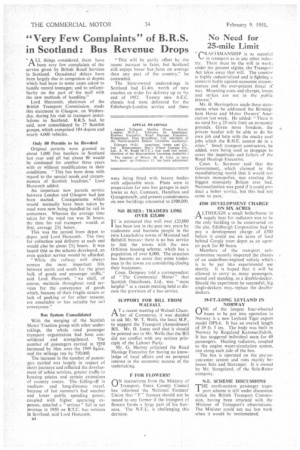"Very Few Complaints" of B.R.S. in Scotland: Bus Revenue Drops
Page 38

If you've noticed an error in this article please click here to report it so we can fix it.
"ALL things considered. there have been very few complaints of the service given by British Road Services in Scotland. Occasional delays have been largely due to congestion at depots' which had been in some cases asked to handle record tonnages; and to unfamiliarity on the part of the staff with the new methods of handling."
Lord Hurcomb, chairman of the British Transport Commission. made this statement in Glasgow, on Wednesday, during his visit to transport installations in Scotland. B.R.S. had, he said, now consolidated its 27 Scottish groups, which comprised 184 depots and nearly 4,000 vehicles.
• Only 80 Permits to be Revoked
Original permits were granted to about 1,000 free hauliers in Scotland last year and all but about 80 would be continued for another three years with or without modifications in their conditions. "This has been done with regard to the special needs and circumstances of Scottish localities." Lord Hurcomb added.
An important new parcels service between London and Glasgow had just been started. Consignments which would normally have been taken by toad were now being handled by rail in containers. Whereas the average time taken for the road run was 36 hours. the time for rail transport would, at first, average 233 hours. This was the period from depot to depot. said Lord Hurcomb. The time for collection and delivery at each end would also be about 23i hours. It was hoped thM as the scheme developed, an even quicker service would be afforded.
" While the railway will always remain the most important link between north and south for the great bulk of goods and passenger traffic." said Lord Hurcomb. " we shall, of course, maintain throughout road services for the conveyance of goods which, because of their fragile nature or lack of packing or for other reasons. are unsuitable or less suitable for rail conveyance."
Bus System Consolidated
With the merging of the Scottish Motor Traction group with other undertakings, the whole road passenger transport organization had been consolidated and strengthened. The number of passengers carried in 1250 increased by 16m. over the 1949 figure, and the mileage run by 750.000.
The increase in the number of passengers carried was largely in respect of short journeys and reflected the development of urban services, greater traffic to housing estates and certain extensions of country routes. The falling-off in mediumand long-distance travel. because of last summer's bad weather and lower public spending power, coupled with higher operating expenses, entailed a "serious" fall in net revenue in 1950 on B.T.C. bus services in Scotland. said Lord Hurcomb.
a4 "This will be partly offset by the recent increase in fares, but Scotland still enjoys lower busjares on average than any part of the country," he contended.
The State-owned undertakings in Scotland had £1.4m. worth of new coaches on order for delivery up to The end of 1952. Twenty new A.E.C. chassis had been delivered for the Edinburgh-London service and these were being fitted with luxury bodies with adjustable seats. Plans were in preparation for new bus garages in such towns as Ayr, Cumnock, Hamilton and Grangemouth, and present commitments on new buildings amounted to £500.000.




























































































